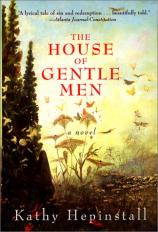The House of Gentle Men: A Novel
Review
The House of Gentle Men: A Novel
I first became acquainted with this wonderfully odd, strangely compelling gem of a novel as a result of a visit to its website (www.houseofgentlemen.com), which, strangely enough, does exactly what it is supposed to do: entertain in and of itself while making visitors interested in the book upon which it is based. The site does note that THE HOUSE OF GENTLE MEN is "A novel for women." The plotline, however, seemed to cut across several genres, some of which I have more than a passing interest in. I accordingly put my masculinity at risk and plunged in. And I'm richer for it. This may be for women, but it is also about men. It is also a mystery, a gothic horror in a sense, a fantasy; and most of all it is a very fine work.
The year is 1941 and the state is Louisiana. As the country prepares for war, a 16-year-old girl named Charlotte is raped by three soldiers. The assault renders her mute for years, until a gift born of pity takes her to an unlikely house on the outer edges of her hometown. THE HOUSE OF GENTLE MEN is visited each night by the women of the town who are abused, forgotten, or neglected. They take their celibate comforts with the residents of the house, men who are haunted by their guilt of past crimes that they have committed against women. When Charlotte visits the house, she is drawn to a new arrival: a man whose past is unknown to her, a man who, while a soldier several years before, raped a young girl.
This is a novel that challenges on so many levels that it is difficult to enumerate them all. It is, obviously, heavily allegorical, yet manages to cleave with the real world with respect to the relationships between men and women, and more specifically, what women want from men in a relationship. There is also some righteous anger directed at men, and a bit at women too. Anyone who reads this book is going to see a bit of themselves, warts and all, somewhere within it. And, I would guess, there is a good bit of the author in there as well.
Though I have never met Hepinstall, and know nothing of her, I would guess that the creation of THE HOUSE OF GENTLE MEN arose from desire and need. It simply reads too much like a personal statement, as if the author has dipped her creative ladle into a well of pain and brought this work forth from the water. While her tale ends on an optimistic note, I have a feeling that Hepinstall has more visits planned, if not to THE HOUSE OF GENTLE MEN, then to its environs. On the strength of this first, brilliantly original novel, she will be most welcomed no matter where she goes.
Reviewed by Joe Hartlaub on January 22, 2011









